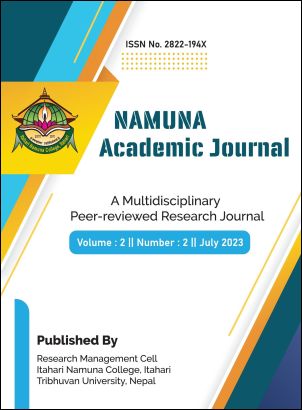Impact of Emotional Intelligence on Academic Achievement in Secondary Education in Nepal
DOI:
https://doi.org/10.3126/naj.v2i2.58810Keywords:
Emotional Intelligence, Achievement, Performance, Perception, Relationship, emotion utilization, managing self and othersAbstract
The capacity to recognize, utilize, comprehend, control, and handle one's own and other people's emotions is known as emotional intelligence (EI). Higher EI holders effectively handle them and work efficiently. Yet, in Nepali practice, nothing has been done to identify pupils' EI. Objective of this study is to determine how emotional intelligence (EI) affects academic success in higher education. Secondary school students in grades 11 and 12 continued to be the study's primary target group. AS a sample, 486 of them were chosen at random from the group of pupils. Students from three districts and two provinces were chosen in equal numbers. To determine the impact of emotional intelligence, the Schutte Self-Report Emotional Intelligence Test (SSEIT) and SEE result were adopted. The ANOVA test was applied to determine the impact of EI on academic attainment. EI and academic achievement have a statistically significant relationship. Yet not all areas have a big impact on academic achievement. For instance, the capacity to use and manage one's own emotions has a significant influence on academic achievement; meanwhile the ability to recognize and manage other people's emotions has little effect on participants' academic performance. While more research is needed to fully understand the relationship between emotional intelligence and academic achievement, the evidence suggests that emotional intelligence may play an important role in academic success.




